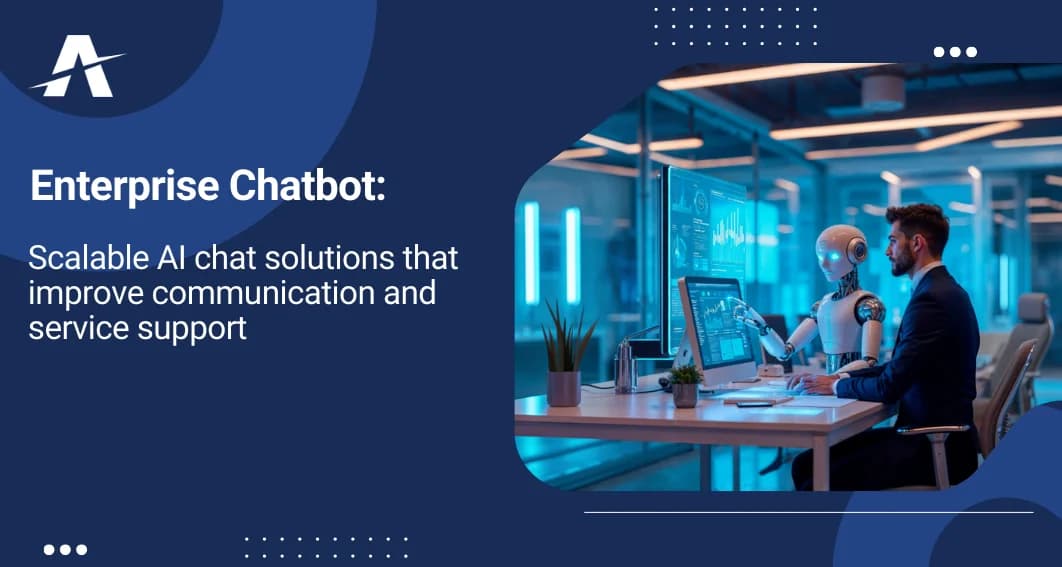Businesses must constantly evolve to meet customer expectations, enhance internal communication, and streamline service delivery. One of the most impactful innovations in this space is the enterprise chatbot, an AI-powered solution designed to handle communication and support at scale.
From multinational corporations to growing enterprises, AI chatbots are no longer just an experimental tool; they are becoming an essential part of customer experience strategies. This blog explores how scalable enterprise chatbots can transform communication, improve service support, and strengthen business operations.
What is an Enterprise Chatbot?
An enterprise chatbot is an advanced AI-driven conversational tool designed specifically for large organizations. Unlike basic chatbots that only handle simple FAQs, enterprise chatbots are scalable, intelligent, and capable of integrating with multiple business systems (CRM, ERP, HR portals, IT service desks, etc.).
They leverage Natural Language Processing (NLP) and Machine Learning (ML) to understand human queries, provide accurate responses, and continuously improve through interactions.
Key Features of Enterprise Chatbots
- Scalability: Handle thousands of queries simultaneously across multiple departments.
- Multi-channel support: Integrate seamlessly with websites, apps, intranets, WhatsApp, Microsoft Teams, Slack, and more.
- Automation: Reduce manual workloads by automating repetitive tasks.
- Personalization: Deliver customized interactions using customer data and history.
- Analytics: Provide insights into user behavior, preferences, and support needs.
Why Businesses Need Enterprise Chatbots
Modern customers expect instant responses, 24/7 availability, and consistent communication. At the same time, employees seek quick access to internal information and IT or HR support. Enterprise chatbots bridge this gap by offering real-time, automated assistance that scales with business needs.
- Improved Customer Support: Instantly respond to inquiries such as order tracking, account details, or troubleshooting steps.
- Enhanced Internal Communication: Streamline access to policies, IT helpdesk, or HR information for employees.
- Cost Efficiency: Reduce staffing costs by automating repetitive queries and scaling support efficiently.
- Consistency and Accuracy: Deliver uniform, compliant responses and minimize errors.
- Data-Driven Insights: Analyze chatbot data to identify pain points and optimize workflows.
Use Cases of Enterprise Chatbots
- Customer Service: Answer FAQs, assist with order tracking, returns, refunds, and troubleshooting.
- IT Helpdesk: Reset passwords, resolve access issues, automate ticket creation, and troubleshoot common problems.
- Human Resources: Answer queries about leave, payroll, and benefits; assist with onboarding and training resources.
- Sales & Marketing: Qualify leads, share product recommendations, demos, and collect customer feedback.
- Healthcare & Insurance: Assist with appointments, provide claim updates, and answer health-related FAQs.
Benefits of Scalable AI Chat Solutions
- 24/7 Availability: Ensure global customers and employees always have access to assistance.
- Multilingual Support: Communicate in multiple languages with AI-driven translation.
- Faster Resolution Times: Provide instant answers and automate ticket escalation.
- Better Customer Experience: Offer personalized support that enhances loyalty.
- Seamless Integration: Connect with CRM, ERP, HR, or IT systems for smooth workflows.
How to Implement an Enterprise Chatbot Successfully
- Step 1: Define Objectives: Identify whether the chatbot will serve customers, employees, or both.
- Step 2: Choose the Right Platform: Select a scalable chatbot platform with AI/NLP and system integration.
- Step 3: Train with Relevant Data: Use chat logs, FAQs, and business docs for accurate responses.
- Step 4: Integrate with Systems: Connect to CRM, ERP, HR, or IT tools for seamless operations.
- Step 5: Monitor and Improve: Continuously analyze interactions and optimize performance.
Future of Enterprise Chatbots
Enterprise chatbots are rapidly evolving beyond simple Q&A bots. With advancements in Generative AI, contextual intelligence, and voice-enabled assistants, the future promises even more personalized and human-like interactions.
Businesses that embrace enterprise chatbots today will gain a significant competitive edge tomorrow by offering scalable, cost-effective, and intelligent communication solutions.
The modern business landscape demands speed, scalability, and intelligent communication. Enterprise chatbots provide all three—streamlining customer support, enhancing internal communication, and reducing operational costs.
By implementing a scalable AI chatbot, organizations can ensure better service experiences, stronger employee engagement, and long-term business growth.
Frequently Asked Questions (FAQs)
1. What is the difference between a regular chatbot and an enterprise chatbot?
A regular chatbot handles simple FAQs. An enterprise chatbot is scalable, integrates with multiple systems, and supports complex workflows.
2. Can enterprise chatbots replace human agents entirely?
No. Chatbots handle repetitive tasks, but human agents remain essential for complex, emotional, or sensitive issues.
3. Are enterprise chatbots secure for handling sensitive data?
Yes. Most platforms comply with GDPR, HIPAA, or SOC 2 standards, using encryption and access controls.
4. How long does it take to deploy an enterprise chatbot?
A basic deployment may take weeks, while advanced multi-departmental bots could take several months.
5. Which industries benefit most from enterprise chatbots?
Banking, healthcare, retail, insurance, IT, education, and telecom—all industries with high communication needs.
6. Do enterprise chatbots support voice interactions?
Yes, many enterprise chatbots include voice-enabled capabilities, making them suitable for call centers and voice-based support.













